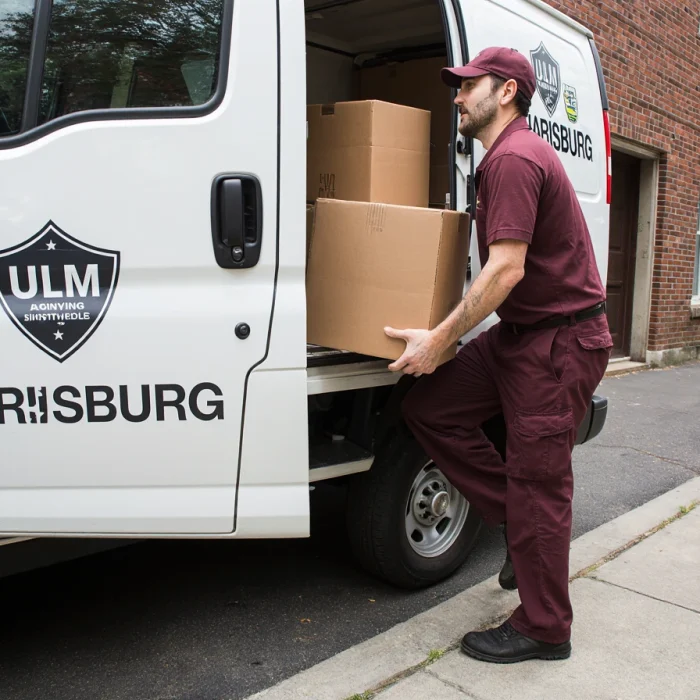Home > Interstate Moving > Moving to Pennsylvania > Moving to Harrisburg
Moving to Harrisburg
Harrisburg, the capital of Pennsylvania, is home to about 50,000 residents in the city proper and over 575,000 in the metro area. Nestled along the Susquehanna River, Harrisburg blends rich history with modern development, offering residents a combination of government, healthcare, and business opportunities. The city is known for its beautiful Capitol building, affordable housing, and family-friendly atmosphere. Harrisburg’s central location makes it a strategic hub, with easy access to Philadelphia, Baltimore, Washington, D.C., and Pittsburgh. For families, young professionals, and retirees, Harrisburg provides a small-city lifestyle with big-city conveniences.

Why More People Are Moving from Other States to Harrisburg
Harrisburg has become attractive for newcomers seeking affordable living with proximity to major East Coast metros. Families value its suburban neighborhoods and access to strong schools in the surrounding Dauphin and Cumberland Counties. Professionals benefit from job opportunities in state government, healthcare, and logistics, while retirees enjoy affordable housing, scenic riverfront views, and quality healthcare. Its location along I-81 and I-76 makes commuting and travel easy, giving residents the best of both convenience and affordability.
Pros of Living in Harrisburg
Pros of living in Harrisburg include low housing costs, central location, and a balanced lifestyle. The city has cultural attractions such as the Whitaker Center for Science and the Arts, the State Museum of Pennsylvania, and numerous annual festivals. Outdoor lovers enjoy City Island, riverfront trails, and nearby state parks. Harrisburg’s affordability compared to Philadelphia or Washington, D.C. makes it a popular choice for those wanting urban amenities without the high price tag.

Ready to get moved? Get a FREE quote now
Book your move easily and stress-free!
Cons of Living in Harrisburg
Challenges include limited nightlife compared to larger metros and some neighborhoods with higher crime rates. Public transportation is modest, and while Amtrak and bus services exist, most residents rely on cars. The job market is steady but heavily reliant on government and healthcare sectors. Winters can be cold and snowy, while summers bring humidity.

What Life is Like in Harrisburg
Life in Harrisburg is community-centered and accessible. Families enjoy suburban-style living with urban amenities nearby. Professionals benefit from short commutes and a growing small-business scene. Retirees appreciate affordable housing and access to medical care. Weekends often include riverfront walks, minor league baseball games at FNB Field, or exploring the historic districts. Its location also allows residents to easily visit Philadelphia, Baltimore, or D.C. for day trips.
Living Costs in Harrisburg
| Category | Harrisburg | National Average |
|---|---|---|
| Housing (Rent per Month) | $1,150 | $1,570 |
| Utilities | $170 | $180 |
| Groceries | $320 | $330 |
| Transportation | $145 | $140 |
| Healthcare | $435 | $440 |
Harrisburg is more affordable than many East Coast cities, especially in housing, making it appealing for families, young professionals, and retirees alike.

Ready to get moved? Get a FREE quote now
Ready to get moved? Get a FREE quote now
Schools and Education in Harrisburg
The Harrisburg School District serves the city, with a range of elementary, middle, and high schools. Families seeking alternatives often consider nearby suburban districts such as Susquehanna Township or Central Dauphin, which are highly rated. Higher education is well represented, with Harrisburg University of Science and Technology, Penn State Harrisburg, and Messiah University offering diverse programs and research opportunities.
Transportation and Getting Around
Harrisburg is car-dependent, but residents benefit from Amtrak services to Philadelphia, New York, and Pittsburgh. Capital Area Transit (CAT) buses operate in the city and surrounding areas, though coverage is limited. Harrisburg International Airport provides domestic and limited international flights. The city’s proximity to major interstates makes regional travel simple and convenient.

United Local Movers: Our Services
Relocating to Harrisburg is easy with United Local Movers. We offer professional moving services, including local relocations, long-distance moves, full packing, and secure storage. Our experienced team understands the needs of families, professionals, and retirees moving to central Pennsylvania, ensuring a smooth and efficient relocation process. With transparent pricing and excellent service, United Local Movers is your trusted moving partner.
Average Cost to Move to Harrisburg
| Move Type | Estimated Cost |
|---|---|
| Local Move (1-2 Bedrooms) | $950–$1,550 |
| Cross-Country Move | $3,700–$6,800 |
| Full Packing Services | + $300–$600 |
| Storage Options | $140–$260 per month |
Harrisburg’s moving costs are relatively modest compared to larger cities, making it affordable for those relocating from across the country.


How to Choose the Right Moving Company
When relocating to Harrisburg, select movers who are licensed, insured, and experienced in Pennsylvania moves. Look for transparent pricing, reliable reviews, and comprehensive services like packing and storage. United Local Movers offers all of these, ensuring your move is smooth, stress-free, and affordable.
Final Thoughts
Harrisburg, Pennsylvania, offers affordability, accessibility, and a community-oriented lifestyle in the heart of the state. While winters can be cold and public transit is limited, the city’s affordability, central location, and cultural offerings make it a strong relocation choice. With United Local Movers as your trusted partner, your move to Harrisburg will be efficient, affordable, and the beginning of a rewarding new chapter in Pennsylvania’s capital city.





